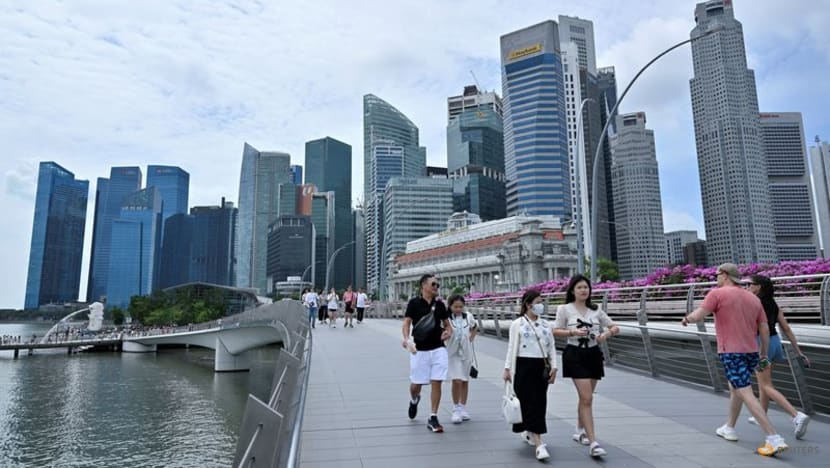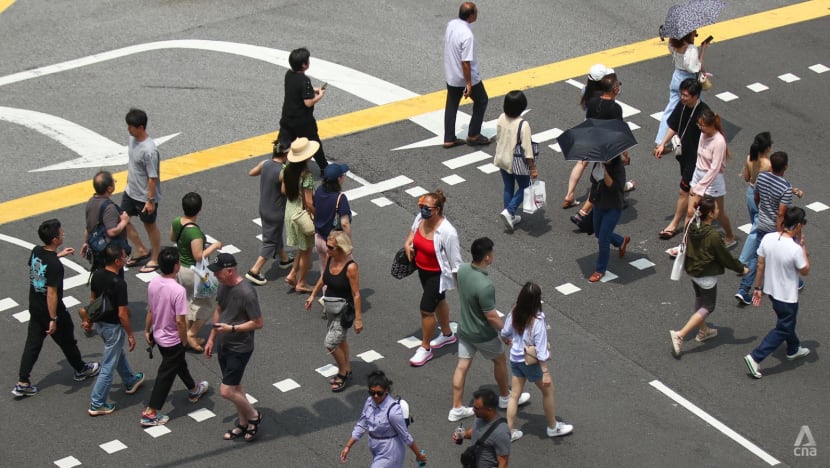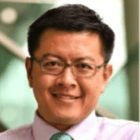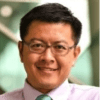Commentary: The value of Total Defence for a Singapore that has known mainly peace and prosperity
As Singapore commemorates 40 years of Total Defence, SMU associate professor of law Eugene Tan considers how it can be more than a concept showcased once a year.

File photo of the skyline in Singapore on Jan 27, 2023. (Photo: Reuters/Caroline Chia)

This audio is generated by an AI tool.
SINGAPORE: Thursday (Feb 15) marks the 40th year of Total Defence. I recall, as a 15-year-old, attending the first Total Defence National Seminar and Camp in 1985 for secondary school students and being introduced to a more holistic concept of what defending Singapore’s sovereignty, independence and way of life was about.
School children commemorate Total Defence Day every year, on the date Singapore fell to the Japanese in 1942. But this day may not typically register strongly for many adults, except perhaps when they hear the sounding of the public warning system.
Things may be different on this 40th year of Total Defence. Power and food supply disruptions will be simulated in an inaugural exercise over a two-week period, involving more than 500 buildings such as schools and offices. The facade lights of 20 prominent buildings will also be switched off for an hour on Thursday night to simulate a blackout around the Padang and Esplanade.
It is perhaps not surprising if we take our peace and security for granted. Most of us would have only known Singapore’s stability, progress and prosperity.
Total Defence is fundamentally about Singaporeans responding cohesively and purposefully to security challenges that threaten Singapore’s independence and well-being - from terrorism and pandemics to social upheavals and economic downturns. The pillars are military, civil, economic, social and psychological defence, with a sixth - digital defence - added in 2019.
This raises the question: What is the value of Total Defence, especially in peacetime?
ODDITIES OF DEFENCE
The core, consistent message of Total Defence is that every Singaporean has a part to play in strengthening the pillars of defences. Although National Service (NS) helps emphasise the role of citizen-conscripts, defence tends to be thought of primarily as the government’s responsibility. Even with NS a widely accepted rite of passage for male citizens, there is still risk in ignoring the non-military dimensions of defence.
The global security situation is deteriorating, according to a report by London-based think-tank International Institute for Strategic Studies (IISS) released on Tuesday, leading to global defence spending rising to a record US$2.2 trillion in 2023.
Military spending is one thing, but it is harder to put a value on defence itself: How much value should we put on deterrence, or peace and stability? Does Singapore spend too much on defence and can we calculate the return on investment?
Defence accounts for the largest expenditure in the annual Budget, so these are pertinent questions given the competition for finite public resources for other needs such as healthcare, education, infrastructure, and climate change mitigation and adaptation.
PILLARS OF TOTAL DEFENCE INTIMATELY CONNECTED
It’s also the case that defence is often intangible: We don’t need it until it is really needed. But its preparation has tangible impact that could run into challenges, such as against the economic and social pillars.
For example, employers are concerned about losing the services of operationally ready national servicemen (NSmen) who attend to their reservist commitments. Employees are, in turn, concerned about how they may be disadvantaged compared to colleagues without similar NS commitments.
In truth, the concerns of employers and employees are not at cross purposes. They all want a safe and secure Singapore. Economic investments are secured through the protective umbrella provided by NSmen, who in turn can benefit from the jobs provided.
But it does point to the need to promote a shared understanding in all stakeholders and its value proposition. Put simply, for Total Defence to resonate, people must understand why it is important and how it is the ultimate guarantor of our basic needs and sovereign identity.
The value of Total Defence cannot be confined to the intangibles of deterrence, peace and security, and as a vital insurance policy.

ARTICULATING AND PRACTISING TOTAL DEFENCE
Total Defence cannot just be a concept showcased once a year. It must be a living doctrine that enlightens us on the threats facing Singapore and helps us better understand our defence and foreign policies, including how we navigate great power rivalry.
Consider Total Defence in the following terms: First, it is about protecting Singaporeans at home and abroad, responding to evolving threats even in peacetime. During the COVID-19 pandemic as border closures became the global norm, Singaporeans overseas who wanted to return were swiftly repatriated even from far flung corners of the world. They knew their country would not leave them behind.
Second, Total Defence is also about projecting Singapore’s influence and enhancing our ability to shape the behaviours of both friend and foe.
A clear example is our robust commitment to regional and international organisations such as the Association of Southeast Asian Nations (ASEAN) and the United Nations. It is about contributing to overcoming global challenges in areas where we have a significant stake, including global trade and investment rules, intellectual property protection, civil aviation and maritime issues, the environment and climate change, and oceans and law of the sea.
Total Defence requires that we do not draw bright-line distinctions between the domestic and international domains. We must be plugged into the global system.
Third, for a small nation, Total Defence is increasingly about contributing to international security by supporting and enabling a rules-based - and not “might is right” - international order.
It is why Singapore has taken a principled stand against Russia’s unprovoked attack on Ukraine, strongly condemning it and imposing appropriate sanctions and restrictions against Russia. The clear and gross violation of international law, the sovereignty and territorial integrity of another sovereign state is a dangerous precedent. Speaking up is in our enlightened self-interest.
Similarly, even as Singapore recognises that Israel has a right of self-defence after Hamas militants’ attacks on civilians and taking of hostages, Singapore also equally recognises that military action taken in exercising this right of self-defence must abide by the principles of necessity and proportionality and the laws of war enshrined in the Geneva Conventions.
Fourth, Total Defence provides the foundational support and security umbrella to the economy and economic development. Trade and investments are sensitive to the threats of insecurity and uncertainty. Whether it is about growing our network of free trade agreements, promoting regional security dialogue and institutions or ensuring food and energy security, they are all about enhancing our economic relevance and resilience. Moreover, our hard-earned, healthy national reserves ensure that we are prepared for emergencies, including financial crises, pandemics and speculative attacks on our currency.
Fifth, Total Defence can nurture the development of our national identity and ethos and promoting civic and social integration. The public often does not know what the Singapore Armed Forces (SAF) does, or how internal security is maintained by the Home Team. Most may not even be familiar with the security threats to Singapore as peace and stability invariably numbs the survival instinct. Greater awareness of the massive effort and investments needed to protect Singapore is necessary.
“OUR OWN LONG-TERM NATIONAL INTERESTS”
Putting it altogether, Total Defence also explains our approach to the great power rivalry.
Singapore’s leaders have consistently reiterated a long-standing policy approach: Singapore seeks to be relevant to both the United States and China, as well as the world. Singapore does not take sides by default, without regard to the issue or context. Instead, it is premised on principled positions in our own long-term national interests.
Total Defence is fundamentally about being able to muster a unified response to any security threat and ensures that we do not become the proxy of another state. How strong our external defence is innately determined by the state of our internal defence.
The challenge for Total Defence in its next bound is to engage Singaporeans in purposeful ways in peacetime so that trust and confidence in why and how we defend and keep ourselves safe can be resolutely and swiftly secured in times of conflict and trouble.
Eugene K B Tan is associate professor of law at the Singapore Management University and has spoken on the value proposition of defence and the armed forces at the SAF Goh Keng Swee Command and Staff College.




















